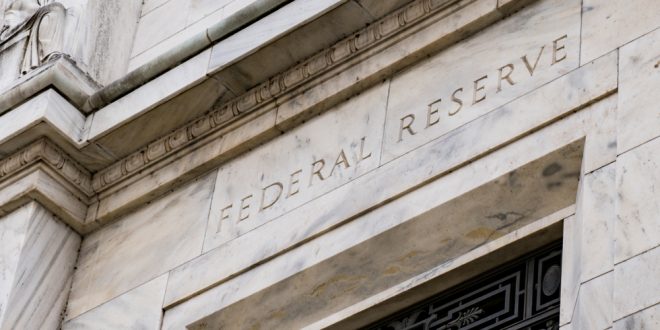The United States Federal Reserve finished its two-day policy meeting on Wednesday and expressed better expectations for the US economy.
The Fed reiterated its commitment to do what is necessary to help the US economy recover from the worst recession in years.
Members of the Federal Open Market Committee (FOMC) vowed to aim for inflation rate to go above 2%, in line with the new policy framework.
In addition, FOMC vowed to maintain current policies even if unemployment continued to decline.
The Federal Reserve now expects the American economic to recover from the impacts of the coronavirus (COVID-19) crisis as the unemployment rate is declining faster than the Fed previously expected in its June statement.
The Fed projecting the US economy will contract by 3.7% in 2020, compared with its previous expectation of a 6.5% contraction, while the unemployment rate is expected to reach 7.6% by the end of the year, before reaching 4% by 2023, the year in which the consumer price index (CPI), or the inflation rate, is expected exceed the 2% level.
This was the first meeting for the US monetary policymakers after adapting the new framework, which allows inflation to go above 2%.
It is also the last Fed meeting ahead of the upcoming US Presidential Elections on November 3, 2020.
In the press conference following the release of the policy statement, the Fed Chair Jerome Powell said that FOMC is not out of tools to face the impacts of the COVID-19 crisis.
“First of all, we do have lots of tools, we’ve got the lending tools, we’ve got the balance sheet, we’ve got forward guidance. There’s still plenty more that we can do. We think that our rate policy stance is an appropriate to support the economy. We think it is powerful… But again we have the other margins tat we can still use. So no, certainty we’re not out of ammo.”
“My sense is that more fiscal support is likely to be needed. Of course, the details of that are for Congress, not for the Fed. But I would just say there are roughly 11 million people still out of work due to the pandemic and good part of those people were working in industries that are likely to struggle. Those people may need additional support as they try to find their way through what will be a difficult time for them.”
“So again, I would say the fiscal support has been essential in the good progress we see now and finally I’ll note just about all — the overwhelming majority — of private forecasters who project an ongoing recovery are assuming there will be substantial additional fiscal support.”
“We expect to maintain an accommodative stance of monetary policy until these outcomes, including maximum employment, are achieved.”
“With regard to interest rates, we now indicate that we expect it will be appropriate to maintain the current zero to 0.25% target range for the federal funds rates until labor market conditions have reached levels consistent with the committee’s assessments of maximum employment and inflation has risen to 2% and is on track to moderately exceed 2% for some time.”
It is worth noting that the vote was not unanimous this time, with Robert Kaplan and Neel Kashkari voting against the action.
Kaplan expects that it will be appropriate to maintain the current target range until the FOMC is confident that the economy has weathered recent events and is on track to achieve its maximum employment and price stability goals as articulated in its new policy strategy statement. He prefers that the FOMC retain greater policy rate flexibility beyond that point.
Meanwhile, Neel Kashkari, who prefers that the FOMC indicate that it expects to maintain the current target range until core inflation has reached 2% on a sustained basis.
 Noor Trends News, Technical Analysis, Educational Tools and Recommendations
Noor Trends News, Technical Analysis, Educational Tools and Recommendations





